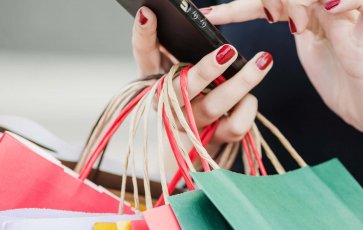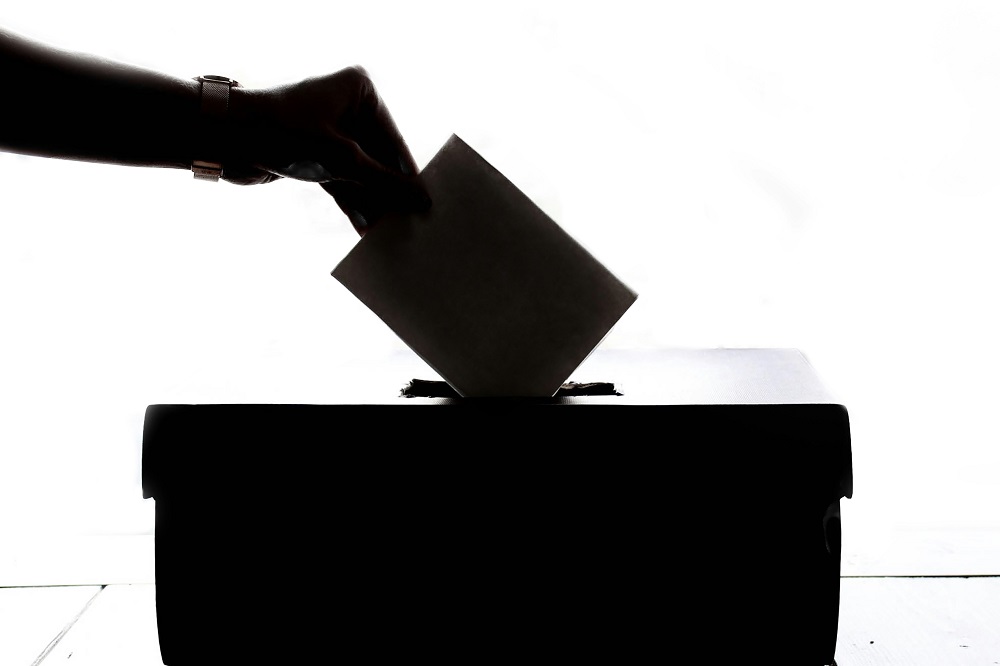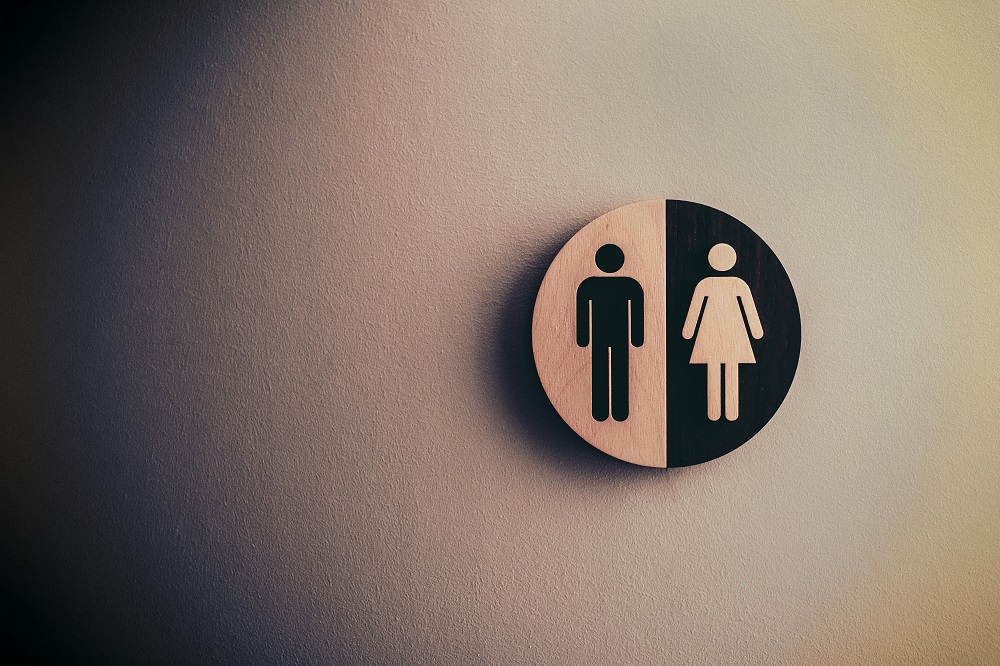The Coronavirus originated in Wuhan, China in December 2019. Since then, the virus has spread all over the world at an exponential rate. On March 11, 2020, the World Health Organization (WHO) classified the COVID-19 virus outbreak as a pandemic. By this time, the virus had already spread to 114 countries. Today, the pandemic has infected people in almost every country around the world. Only a handful of countries remain that have not reported any cases of the virus. The world as we know it has changed entirely. The world we live in today is vastly different from what it was just 6 months ago. Governments of countries all around the world have imposed several restrictions on travel and movement. While most countries are slowly coming out of the lockdown, the threat from the virus is still real.
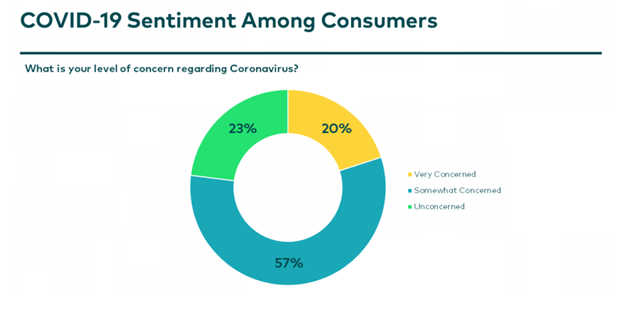
The new customer, in the new normal
Such a crisis on a global scale is not something anyone could have foreseen. Industries, as well as customers, were not prepared for a crisis of this magnitude. Several industries have witnessed a significant drop in demand and some industries such as the travel industry has been shut down entirely, and has been slowly opening only recently. Most businesses and shops have been closed and consumers are having a hard time adapting to these drastic changes. Research conducted during the course of the crisis reveals significant changes in consumer behaviours, since it has become difficult to get access to essential supplies. As a result, a new kind of customer with unique behaviours is emerging. For business in general to make it through the current crisis, companies need to anticipate the needs of this new customer.
The shift in consumer purchasing behaviour
Customer analytics reports on the shopping data precisely exhibit the changes in consumer purchasing behaviour due to outbreak of the Novel Coronavirus and the lockdown proctocols laid to contain the spread of the pandemic. In the early stages of the pandemic, consumers were worried about their family’s health and whether they would be able to get essential supplies for their basic needs. During these stages, consumers acted on their fears and started stockpiling food and other essentials to prepare for a prolonged stay at home. Consumers shopped for a variety of items such as hand sanitizers, and antibacterial wipes to stay clean and decrease the chances of getting infected. They even purchased computer monitors to set up home offices and help their children attend school remotely.
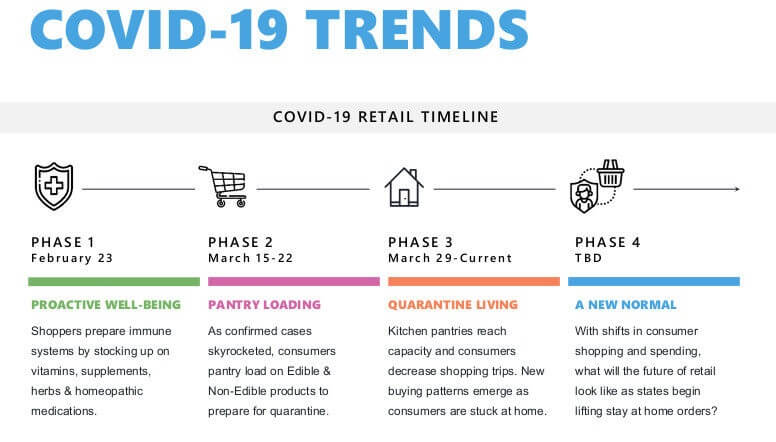
Source: Spins
In order to avoid going to stores, consumers started to buy significantly higher quantities of products. But a few months into this situation, consumer behaviour seems to be undergoing another change. Consumers have started making more trips to cheaper stores and have started stocking up on items from private labels instead of popular brands. They have also cut down on indulging on snacks and sodas at convenience stores.
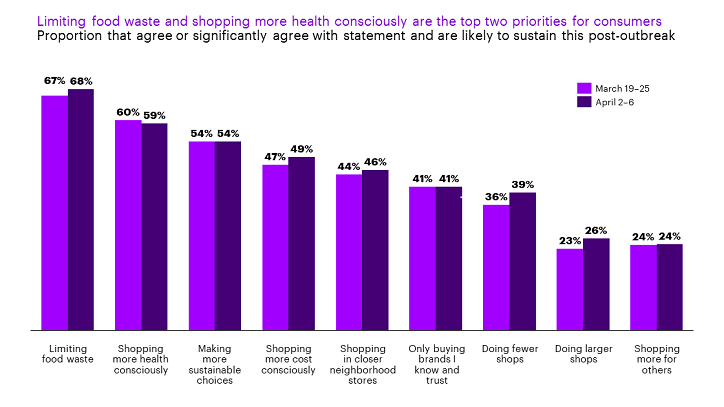
Source: Accenture
Here are a few reasons why the initial change in consumer purchasing behaviour is changing again:
• Increasing unemployment – Since the initial stages of the virus outbreak, the financial situation has become much bleaker. Unemployment in the US alone has risen by 14.7% and over 33.5 million people have filed for unemployment in the past seven weeks (CNBC). As a result, the budgets of several families have significantly reduced.
• Psychological impact – Not everyone will be impacted by the unemployment crisis. Some people will have the same income as they did before the virus outbreak. However, reading the unemployment reports has a significant psychological impact on the consumers. This lingers in the back of their minds as they scan stores and put items into their baskets. It makes them think that they need to be more careful about how they spend their money.
• Private labels – McKinsey & Co conducted a survey in the US and a third of respondents said that their income has been affected by the COVID-19 virus outbreak. Over 50% of the people who were surveyed said that they are cutting back on their spending (CNBC). One of the easiest ways to cut down on expenses is to purchase the products you need from a cheaper brand. Therefore, consumers have become more willing to choose a value option instead of their favourite brand.
As consumers were looking to spend less, they bought the cheapest option that was available. In the four weeks until May 4, private label sales went up by 19% while national brand sales only increased by 12% (CNBC).
• Affordable luxuries – People are no longer going out and spending money on social activities, so they have little extra money. Since people are staying at home for a prolonged period, most consumers are spending this extra money on themselves and their homes. People are spending more money on affordable luxuries to fill the void that the lack of social activity has left in their lives. As a result, sales of makeup and luxury bedding has gone up by 57% and 100% respectively (CNBC).
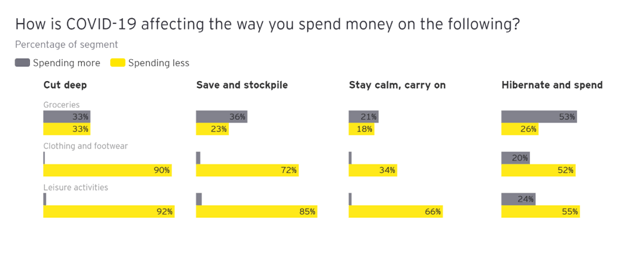
Source: EY
The primary reason for changing consumer behaviour is the economic downturn caused by the coronavirus pandemic. However, this economic crisis is much more complex than previous ones, which has made it harder to predict. In past recessions, the main concern of people was money. But now, they need to worry about both their health and money. The most significant factor that has influenced the consumer purchasing behaviour is whether their income has been affected by the economic downturn. The people who have lost their jobs are cutting deeply on their spending. Some people have increased their spending on essentials and decreased all other expenses. People most concerned about the impact of the pandemic on their health, are spending more at once to avoid frequent visits to the store. There are also some people who are taking the necessary precautions but are still carrying on with their regular purchasing habits.


